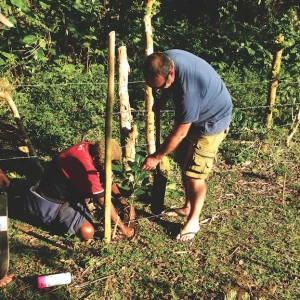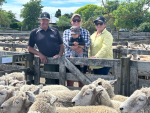While coffee, coconut oil and grapes may not seem to have anything in common, a Marlborough RSE accredited contracting firm is proving otherwise.
Vinepower owned by Jason Kennard and Jono Bushell is combining its own skills with those of the Ni-Van (Vanuatu) RSE workers to develop one of the island’s local economy.
Vinepower has been part of the RSE programme for more than six years. While originally they were employing workers from Thailand and Tonga, they branched out to employ men from the islands of Vanuatu. The RSE scheme was established to fill a major hole in terms of a labour force here in New Zealand, while also providing an income stream to some of our poorer Pacific neighbours. Money earned by the workers is sent home, to help improve the lives of those on the islands.
Bushell says that has worked remarkably well. Having visited Vanuatu on recruiting missions for a number of years, he said the conditions are anything but easy.
“It’s pretty primitive. In Tanna (one of the southern islands) for example where we are working, the closest water source is down a 100-foot ravine. People bathe in it, they wash their clothes in it and they carry drinking water back up the hill for the village. They have no pumps or anything like that.”
But money the men have earned while in New Zealand is making a difference he says.
“A lot of it goes into housing and education is a big one. That is great to see. And a lot of people set up a business. But when I say to them, ‘Oh that’s great, what sort of business are you setting up’, they tell me they are going to set up a store. Right! They all set up these stores, and there’s one next door to them, and another next door to that, and they are all selling the same stuff. When you drive down the road in Tanna in particular, there are 15 stores all in a row, with exactly the same stuff in them.”
Bushell could see there was a need for a more sustainable business solution. He and Kennard, along with a business partner based in Tanna, came up with the idea of establishing a coconut oil factory and establishing coffee plantations.
Coffee is nothing new to Vanuatu, but it was apparent to Bushell that the potential of the plantations in Tanna wasn’t being met.
“I know nothing about growing coffee, but I could see that they were being mismanaged and not maintained. The coffee industry has been there for 25 to 30 years and the bushes were planted all that time ago. With no maintenance undertaken, they have grown into great big trees, so you can’t access the berries.”
When he found out that a number of villagers had pooled their land and leased it to Tanna Coffee, but the area had never been planted, he swung into action. After negotiating with Tanna Coffee he secured permission to clear a large block of land, (7 ha) and plant with coffee and vegetables.
“We had a group of guys who had worked for us in New Zealand in the vineyards and we took them up and said the first thing we were going to do was clear about a hectare of the land and plant it. While they thought that it was going to be so different from the work they had undertaken in New Zealand, they quickly realised that it’s not so much about the crop you are growing, it’s about the work ethic. I said to the guys, when we set it up, we set it up like the grapes – and they understood that.”
Villagers helped out, clearing the thick scrub by hand with bush knives. There was no modern equipment to help them out. Of the original 10 men who started out, few are left, given they have come back to New Zealand under RSE. Bushell says they have queues of people lining up to replace them, knowing that if they do a good job, they will also be considered for future RSE work over here.
The cost is minimal by vineyard standards. The coffee plants themselves cost nothing, given there are literally thousands of plants growing wild in the undergrowth. These are transplanted into the newly developed plantation. Inter row plantings include a vast range of vegetables and fruit, from peanuts to corn, water melon to zucchini. Trials on cauliflower, broccoli and peppers are now underway. The aim is to be able to grow at a quality level that will enable the villagers to sell the produce to hotels and markets. But a water supply for irrigation will be necessary, something that Bushell and Kennard are now looking into.
As for the coconut oil, both men were aware of the growing trend towards this product worldwide. Coconut plantations were planted on Tanna many years ago, for copra, but the bottom fell out of the market due to transport and production costs. Since then the coconuts have been left to grow wild.
“There are millions of coconut trees and the bulk of them just fall to the ground and nothing is done with them. There is going to be a bit of work over the years to bring those plantations back into line, but at the moment there is an abundance of coconuts that we can collect.”
So villagers are paid to pick up the coconuts, which are then collected by a truck once a week. Bushell says it costs $2000 a week to buy the coconuts, but they should be able to process
up to 16,000 a week for virgin
oil, in a factory that is currently being built.
There is no doubt that the two major projects will increase the lifestyle of the island. Without such opportunities most of the population would have to survive on subsistence farming. Instead they are now able to put to use skills they have learned in New Zealand, or gain work skills at home before coming out here.
“We are putting back into the communities there and we are teaching people how to utilise the skills they have learned. But we also want a continued supply of workers for RSE and be able to up skill them. When we take on people we want to know that when they come here we have a really good calibre of person who is prepared to work and has a good work ethic. By putting them through these different businesses we are setting that up.”
That is RSE working for everyone. ν
This email address is being protected from spambots. You need JavaScript enabled to view it.












